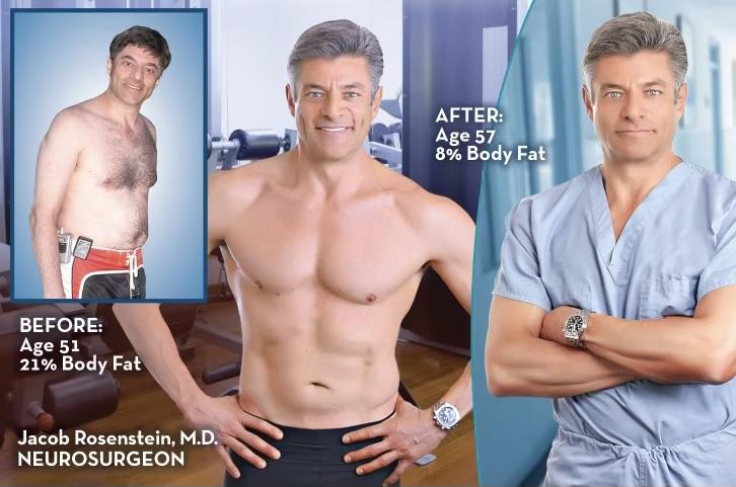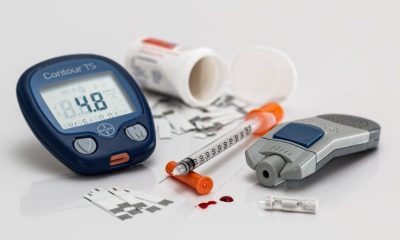Health
How to Reverse Age: Dr. Jacob Rosenstein of Southwest Age Intervention Institute on His Age Management Journey
Published
12 months agoon
By
Terry Power
The fight to reverse, or at least halt, the aging process is arguably the final frontier of medicine. Modern medicine has accomplished incredible feats, from life-saving vaccines & antibiotics to cutting-edge gene editing technology to various 3D printing techniques. Despite this progress, the medical industry has yet to conquer its proverbial white whale, the gradual aging process. However, many innovative projects in anti-aging science and biohacking technology have emerged in the past few decades.
Dr. Jacob Rosenstein
Recently, Bloomberg reported that ex-Braintree Founder Bryan Johnson now spends $2 million every year in an attempt to reverse the effects of aging. Johnson, 44, told Bloomberg that he leverages a team of 30 doctors intending to become “18 years old again.” Football legend Tom Brady, who finally retired at 45 this year, is a strong advocate for various anti-aging and ‘unconventional’ tactics. In addition to helping him become the winningest quarterback of all time, Brady’s efforts propelled him to win multiple Super Bowls at the end of his career, well into his late 30s and early 40s, an achievement previously thought to be impossible. LeBron James, the 38-year-old who just led the Lakers to upset the two seed in the 2023 playoffs, reportedly spends $1.5 million annually to slow down the aging process and remain productive at a high level. Perhaps best illustrating his longevity and success, James broke Kareem Abdul-Jabbar’s record for the all-time NBA points scored earlier this year. To maintain his health and sharpness as he ages into his late thirties Lewis Hamilton, F1’s record holder for the most wins, leverages cryotherapy and follows a strict vegan diet. In addition to those mentioned, many other athletes utilize these techniques as team budgets for recovery technology and anti-aging strategy are enormous.
Dr. Jacob Rosenstein, of Southwest Age Intervention Institute, is one of the most vocal proponents of and innovators in anti-aging or ‘age management,’ as he calls it. Dr. Rosenstein is uniquely equipped to help patients slow down their aging and optimize their functional health & productivity levels because of his medical background and personal journey. Dr. Rosenstein is a board-certified neurosurgeon and a Diplomate of the American Board of Neurological Surgery. He has been in private practice with North Texas Neurosurgical Consultants in the Dallas/Fort Worth Metroplex since 1985. While he specializes in neurosurgery, he is also very passionate about age management and follows a strict regimen himself. Dr. Rosenstein found age management naturally, as all great entrepreneurs do, through a problem he wanted to solve in his own life.
As a neurosurgeon, Dr. Rosenstein has long and demanding days, working at a high level, on his feet, for 16 hours straight. In his mid-50s, he noticed his energy cratering and productivity levels declining. Worst of all, he was getting sleepy at the end of his days, something a neurosurgeon cannot afford to do. Worried that this was the inevitable result of aging, but unwilling to accept his predicament, Dr. Rosenstein decided to put his expertise to use and research more about why we age and what can reverse the process. Among many findings, one of the most significant distinctions he came across was the difference between our calendar or chronological age — the number of years lived — and our biological or physiological age — how old your cells are. Curiously enough, one’s cells could be older or younger than what most people conceive of as their ‘real’ age. Upon second thought, however, that assumption is backward as our biological age is more closely related to how we feel & function and our health outcomes.
Dr. Rosenstein hit the ground running as he researched all the best ways to slow down and reverse biological aging. Fundamentally, Dr. Rosenstein learned that a healthy lifestyle is the most consistent way to manage age. Simply put, if you live an unhealthy lifestyle, eat sugary & processed foods, do not exercise, smoke, and drink alcohol, you’re not only going to not only shorten your lifespan, but you are also going to shorten your healthspan or the years of your life that you are healthy and vigorous.
At 54, Dr. Rosenstein started implementing the new research into his life to increase his productivity levels, expand his health span, and feel better overall. This led him to discover telomeres. After birth, your telomeres are long, and as you age and your cells divide, pieces of the telomeres break off. Eventually, they get so short that the cells can no longer divide, ultimately dying. Now, telomere shortening is accepted as a well-known indicator of biological aging. However, at the time, the technology to accurately measure telomere length was only available in the research laboratory. Even without this tool, Dr. Rosenstein went from 21% body fat to 11% in just six months at 54 by making intentional lifestyle changes. Four years into his age management journey, the technology to measure telomere length was finally available outside the research laboratory. Dr. Rosenstein went to get tested and, at 58, his biological age was that of a 39-year-old. Dr. Rosenstein kept walking the path and two years later, he got another telomere test at 60. Impressively, his telomere kept growing and his biological age was that of a 10-year-old. Four years later, at 64 years old, Dr. Rosenstein went to get another telomere test. He figured the results would be good, but his telomeres would probably be a bit shorter as he was in his mid-60s. Almost unbelievably, his telomere length grew once again and his biological age was that of a newborn.
Throughout this process, Dr. Rosenstein’s energy, productivity, and vitality issues improved, ultimately going away entirely. Even in his 60s, he felt better than in his 30s and 40s. Despite being older chronologically, Dr. Rosenstein’s healthy lifestyle made him younger biologically. Along the way, Dr. Rosenstein realized he could replicate this process for his patients as he was getting repeatable and consistent results implementing these practices on himself. Eventually, Dr. Rosenstein would go on to found the Southwest Age Intervention Institute in addition to his work as a neurosurgeon.
The Southwest Age Intervention Institute is the culmination of Dr. Rosenstein’s professional and personal journey. The Institute takes a functional and integrated approach to age management. Dr. Rosenstein and the SAII team use nutrition, exercise, cutting-edge technology, nutraceuticals, extensive blood work, lifestyle changes, and personal medical history to come up with a plan to balance their patients’ hormones, lower their inflammation, improve their mental clarity and sexual health, increase their metabolism speed, and return that youthful feeling. Dr. Rosenstein works closely with all of his clients and personally designs a customized treatment plan or ‘personal health blueprint,’ as he puts it. This process includes an in-depth, 90-minute private consultation with Dr. Rosenstein, blood work comprising more than 90 different biomarkers, a carotid artery intima media ultrasound scan, an iDXA total body composition scan, a thorough fitness assessment, and mental acuity & cognitive testing. This extensive pre-work reveals every aspect of the patient’s health and enables Dr. Rosenstein to create the best individualized treatment plan possible. Once implemented, Dr. Rosenstein monitors his patient’s progress, conducting an in-person analysis, comprehensive blood tests, and full body composition scans at least every three months. The SAII also has a hyperbaric oxygen therapy chamber for patients to engage in hyperbaric oxygen therapy (HBOT). HBOT is one of the most popular treatments used by world leaders, celebrities, and premier athletes who want to look and feel younger. HBOT reverses the aging process, creates new stem cells, improves heart & brain function, tightens skin, and increases sexual drive & performance while the client sits in a “first-class style” seat with access to their phones, laptops, and a flat-screen TV.
Dr. Rosenstein’s clientele is mostly comprised of overachievers, CEOs, doctors, attorneys, and other men and women of all ages who live high-paced and demanding lives. Ari Rastegar, CEO and Founder of Rastegar Property Company, met Dr. Rosenstein when he was 32 and full of anxiety and stress. Dr. Rosenstein tested his telomeres, finding he was biologically 42. Years later, Dr. Rosenstein has reduced Rastegar’s biological age to that of an 8-year-old. Rastegar attests, “Now my testosterone sits around 800. Energy: Through the roof. Libido: Through the roof. And I can remember what I felt like when I was in my early 20s. I feel better than I have in my entire life.”
As a man’s testosterone levels typically peak in his late teens, declining every year after that depending on stress and lifestyle variables, many of Dr. Rosenstein’s male clients come in with issues related to this decline. Dr. Rosenstein’s techniques and treatment program can help with loss of self-confidence, decreased energy, reduced sex drive & stamina, loss of concentration & focus, diminished results from exercise & diet, loss of motivation, increased fatigue, slowing metabolism, erectile dysfunction, lack of sleep, weight gain, type II diabetes, coronary artery disease, and other age-related illnesses. Beyond the extensive tests and recommended lifestyle changes, Dr. Rosenstein and the Southwest Age Intervention Institute team use cutting-edge treatments to improve men’s sexual health. The GAINSWave treatment is a scientifically proven, non-invasive, technique that uses low-frequency acoustic waves to help with erectile dysfunction, treat Peyronie’s disease, and improve sexual performance. The Priapus Shot® or P-Shot®, named after the Roman God of Virility, is a modern medical procedure that leverages Platelet Rich Plasma (PRP) to treat erectile dysfunction and premature ejaculation, among other issues. It is also one of the only nonsurgical methods that may increase penis size.
All women experience unique hormone level fluctuations and other individualistic biological changes as they age. These changes can affect their energy, mood, and overall health. Many of Dr. Rosenstein’s female clients come to his office with these issues. Sometimes, they are amplified by Peri-Menopause, Menopause, or stress. Dr. Rosenstein and the Southwest Age Intervention Institute team help their clients with hormone imbalance, low energy & fatigue, anxiety & depression, slow metabolism, weight gain, muscle loss, sagging skin, wrinkles, age spots, vaginal dryness, loss of elasticity, diminished libido, lack of sleep, inability to focus, osteoporosis, type II diabetes, thyroid dysfunction, coronary artery disease, and other age-related illnesses.
Dr. Rosenstein quips jokingly, “I tell my patients our goal is to have you live to 100 and beyond. And I tell them, if you don’t get to 100, you’re going to make me look bad. So you’ve got to do it right? So my goal is to motivate them, coach them, help them along the way, and monitor their progress.”
Now, at 68, Dr. Rosenstein has no plans to slow down. Biologically he is as young as ever and still capable of handling long and complicated cases as a neurosurgeon, having retained his mental and physical edge. Dr. Rosenstein states, “I’m a good example of what can be accomplished if you pay attention to these things.”
Check out Dr. Jacob Rosenstein’s book on aging, “Defy Aging: Make the Rest of your Life the Best of Your Life,” or the Southwest Age Intervention Institute website for more information.
You may like
-


Want agency in the AI age? Get ready to fight
-


Age Of Autism Diagnosis Has No Impact On Quality of Life, Study Finds
-


Best practices for a successful SaaS cloud transformation journey
-


Diabetes At Younger Age Linked To Higher Risk Of Dementia: Study
-


High Dose Of Vitamin D May Reduce Psychiatric Symptoms At School Age: Study
-


Lifelong learning in the age of AI with John Domingue of Open University
Health
Feeling Tired All The Time? Possible Causes And Solutions
Published
11 months agoon
22 June 2023By
Terry Power
Long days of work, lack of sleep, and stress at the office can be the most common factors that make you feel tired. However, feeling “tired all the time” (TATT) without known reasons can be an indication of an underlying health issue that needs immediate attention.
Finding the exact cause of the lingering tiredness can be the first step toward solving the symptom.
Health conditions that cause fatigue:
1. Anemia – Anemia is one of the most common causes of fatigue. A person who has anemia does not have enough red blood cells in the body, causing symptoms such as tiredness, dizziness, feeling cold and crankiness.
Most often, anemia is caused by iron deficiency. Hence, the condition can be best resolved by including iron-rich foods in the diet and use of iron supplements.
2. Sleep Apnea – It causes the body to stop breathing momentarily during sleep. The condition can affect the quality of sleep and hence make you feel fatigued.
For milder cases of sleep apnea, lifestyle changes such as losing weight or quitting smoking can help solve the sleep disorder. In more severe cases where there is an obstruction in breathing, surgeries and therapies can help.
3. Diabetes – A person who has diabetes has changes in blood sugar level, which can cause fatigue. A patient who is already on diabetic medication can also experience tiredness as a side effect of the medication.
Early identification and taking the correct treatment is the key to managing diabetes. Losing extra weight and having a healthy diet also help in the treatment.
4. Thyroid – Thyroid diseases can be due to an overactive or an underactive thyroid gland. In people who have an underactive thyroid (hypothyroidism), the metabolism slows down leading to symptoms such as lethargy and fatigue. In people with an overactive thyroid (hyperthyroidism), the metabolism speeds up leading to fatigue and difficulty sleeping.
Right diet and lifestyle choices, along with medications, can help in thyroid management.
5. Infections – A person can show symptoms of fatigue when the body is fighting a viral or bacterial infection. Infections ranging from the flu to HIV can cause tiredness.
Along with fatigue, other symptoms such as fever, headache, body aches, shortness of breath and appetite loss can also accompany the infection. Treating the symptoms and taking adequate rest helps in faster recovery.
6. Food allergies – Fatigue may be an early warning sign of hidden food allergies and autoimmune disorders such as celiac disease. Identifying the allergen using a food allergy test or through an elimination diet can help in allergy treatment.
7. Heart disease – If you feel exhausted from an activity that used to be easy, then it is good to check your heart health, as fatigue can be an indication of underlying heart disease.
8. Depression/ anxiety – Fatigue can also be an indicator of a mental health disorder such as depression or anxiety. A combination of medication and psychotherapy can help relieve symptoms.
Lifestyle causes
Apart from serious health conditions, certain lifestyle habits such as dehydration, poor diet, stress and insufficient sleep can cause exhaustion. Having a well-balanced diet, regular exercise and routine sleep can help solve fatigue caused by lifestyle habits.
Published by Medicaldaily.com
Health
How To Overcome Your Sleep Debt And Reclaim Energy
Published
11 months agoon
22 June 2023By
Terry Power
Picture this: you’re burning the midnight oil, studying or binge-watching your favorite shows, all at the expense of a good night’s sleep. Have you ever stopped to think about the toll it takes on your body and mind? The consequences can be more serious than you might realize.
Not getting enough sleep can translate into a multitude of issues, including weight gain, lack of focus, tiredness, a haze of confusion, and even depression. If you too are encountering similar issues lately then chances are you have a sleep debt.
Wondering what is sleep debt?
People from 13-18 years of age need 8 hours of sleep, whilst adults beyond that age will require at least 7 hours of snooze.
Sleep debt is a collection of the total hours you haven’t slept or traded your sleep for something else. Sleep debt keeps piling up as a person falls short of the total hours of sleep recommended for an adult, according to the Centers for Disease Control and Prevention.
And when you keep letting go of your sleep for other activities, the body adapts to the new normal and effects start to reflect on the energy levels, which deplete.
“However, like every other debt out there, this too has a repayment option,” Dr. Kunal Kumar, medical director of the Sleep Center at Einstein Medical Center in Philadelphia, told Livestrong.
Below are some expert-vetted ways you can pay back the sleep debt. (Courtesy: Livestrong and Sleepfoundation)
Just like financial debt, imagine sleep debt as a debt you owe to your body. It needs to be repaid. The good news is that catching up on sleep is indeed possible.
- Maintain a set sleep schedule: Overhauling the sleep schedule is a pretty difficult task to achieve, and it’s best to do that gradually. Create a set sleep schedule by making some small changes to your routine. Instead of making abrupt shifts in your bedtime or wake-up time, adjust them gradually by 15 to 30-minute increments.
- Minimize your gadget usage: Wind down activities and minimize electronic usage before bed to promote better sleep. Relax and prepare for quality sleep by dimming the lights and setting an alarm for 30 minutes to an hour before bed.
- Reshuffle your sleeping arrangements: Are you finding it hard to get a good night’s sleep due to excessive sweating? Well, here’s a handy solution: consider upgrading to a cooling mattress or opting for cooling sheets. These innovative sleep essentials can help regulate your body temperature, and keep you comfortably cool throughout the night, ensuring a more blissful slumber. Memory foam pillows can work wonders in relieving neck and back discomfort in case you are struggling with backache.
- Improve the bedroom environment: Create a sleep-friendly bedroom environment by adjusting the temperature for comfort, and blocking out disruptive lights, or noises that might disturb your restful slumber. And if your mattress, pillow, or sheets are worn out or no longer providing the support you need, consider treating yourself to new ones.
Published by Medicaldaily.com
Health
Omega-3 Fatty Acids Slow The Progression Of Amyotrophic Lateral Sclerosis: Study
Published
11 months agoon
22 June 2023By
Terry Power
Omega-3 fatty acids are known for a range of health benefits, from promoting brain and heart health to reducing inflammation and protection against several chronic conditions.
In a new study, researchers found that omega-3 acids, especially the type found in foods like flaxseeds, walnuts, chia seeds, canola oil and soybean oil, can slow down the progression of amyotrophic lateral sclerosis (ALS).
It is a debilitating nervous system disease that gradually worsens over time and can be fatal. The condition results in a loss of muscle control and affects the nerve cells in the brain and spinal cord. It is also known as Lou Gehrig’s disease after the baseball player who was diagnosed with it.
The initial symptoms of the disease include muscle weakness, difficulty in walking and hand movements. The symptoms can slowly progress to difficulties with chewing, swallowing, speaking and breathing.
The exact cause of ALS is not known. However, around 10% of people get it from a risk gene passed down from a family member. It is estimated that more than 32,000 people in the U.S. live with the condition.
In the latest study, researchers from Harvard T.H. Chan School of Public Health in Massachusetts evaluated 449 people living with ALS in a clinical trial. The team assessed the severity of their symptoms, the progression of their disease, along with the levels of omega-3 fatty acids in their blood, for 18 months.
The study suggested that alpha-linolenic acid (ALA), a type of omega-3 found in plants, is particularly beneficial in slowing the progression of ALS. The participants with the highest levels of ALA had a 50% reduced risk of death during the study period compared to those with the lowest levels of ALA.
Researchers also found a reduction in death risk in participants who had eicosapentaenoic acid, the type of omega-3 fatty acid found in fatty fish and fish oil, and linoleic acid found in vegetable oils, nuts and seeds.
A previous study conducted by the same team suggested that a diet high in ALA and higher blood levels of the nutrient could reduce the risk of developing the condition.
“In this study, we found that among people living with ALS, higher blood levels of ALA were also associated with a slower disease progression and a lower risk of death within the study period. These findings, along with our previous research suggest that this fatty acid may have neuroprotective effects that could benefit people with ALS,” said Kjetil Bjornevik, the lead author of the study.
Published by Medicaldaily.com
